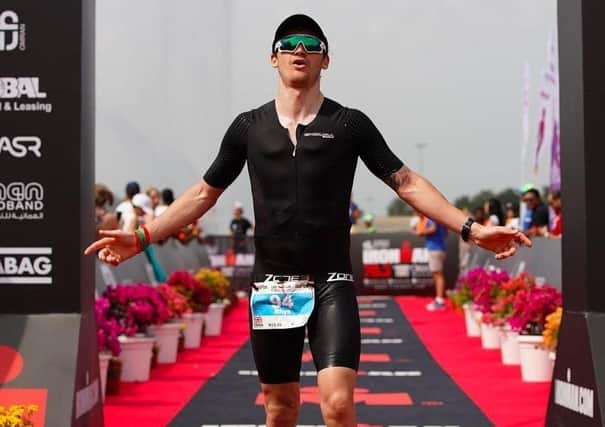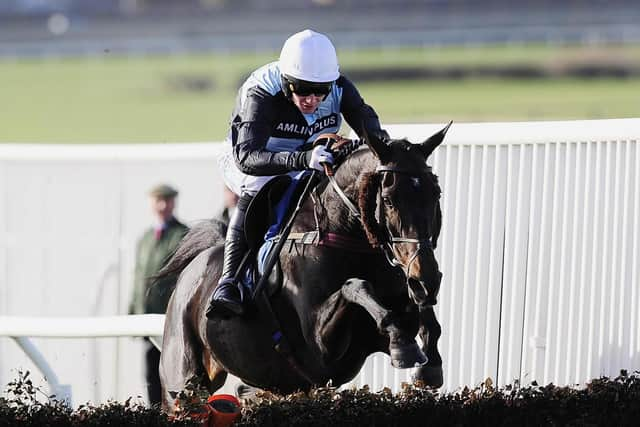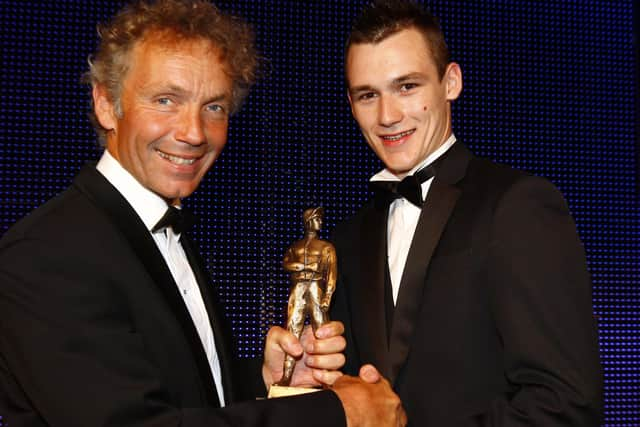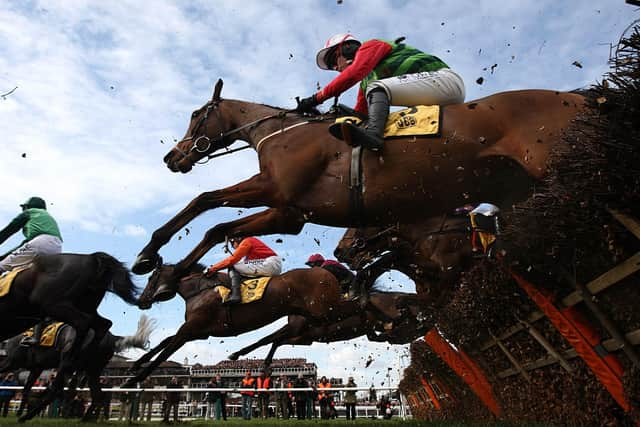Rhys Flint - All or nothing for Fair Along jockey who became an Ironman


Yet, while this could apply to many of his horse racing triumphs in the saddle, he is referring to his success in the suffocating heat of Oman.
Ten years after Flint won a second West Yorkshire Hurdle at Wetherby on the diminutive Fair Along, the horse of his dreams, this former iron man of the saddle has embarked upon a second sporting career – in the endurance sport of Ironman.
Advertisement
Hide AdAdvertisement
Hide AdAnd his performance in the prestigious Oman 70.3 event was as rewarding, if not more so, than any of his feats in racing, becoming champion conditional in 2010, before losing the unforgiving battle with the scales due to his physical frame.


This Middle East race, a mini Ironman, comprised a 1.2-mile swim in a warm sea – Flint safely avoided the sharks lurking off the coast – a 56-mile bike ride and then a debilitating half marathon. And, by completing the course in four hours 20 minutes, he was seventh overall and, crucially, first home in the 25-29 age group.
However, the image of Flint staggering across the line, his weary arms only half aloft due to fatigue and dawning realisation about the magnitude of the achievement, only tells part of the story.
Flint, a graduate of Doncaster’s then Northern Racing College before becoming a jockey, had prepared for February’s race by helping his parents John and Martine train their string of racehorses at the family’s stables in Bridgend.
Advertisement
Hide AdAdvertisement
Hide Ad“Going into that race, I had never trained so hard in my life,” Flint, 29, told The Yorkshire Post in an exclusive interview. “I was riding out every day. My missus was pregnant so I was riding 11 to 12 horses a day, going on the bike to do 60 miles, swimming and running.


“I was waking up and my legs were aching. It was hell. I was literally absolutely all out. Going into it, I was quite happy. When I won my age group, it was quite overwhelming. In a horse race, if you haven’t the horse under you, there’s nothing you can do. In the triathlon and Ironman, it’s all on you.”
The Covid-19 global lockdown denied Flint the chance to test his fitness and proficiency against the world’s best, though he harbours hopes of lining up in Hawaii where competitors swim with wild dolphins.
It has, however, given him a chance to enjoy fatherhood and recover from a broken femur and hip suffered in a cycling accident.
Advertisement
Hide AdAdvertisement
Hide AdTypically, he was swimming within two weeks of the stitches coming out – his jockey’s mentality kicking in. And this year’s hiatus has afforded time to reflect on his all-too-brief career in racing and association with the brilliantly brave Fair Along.


This was the pony of a Flat horse trained by Flint’s parents – and he would, invariably, sneak home from school to school him over obstacles to the despair of his father.
When owner Alan Peterson realised this was an above-average horse, Fair Along moved to the yard of top trainer Philip Hobbs – and it was here that Flint began his career as a professional rider after leaving school at 16.
He’d been promised the ride if he proved to be good enough and Peterson was true to his word.
Advertisement
Hide AdAdvertisement
Hide AdFlint’s rise through jump racing’s ranks was meteoric – a natural, boyish charm matched by a steely determination and natural ease on horses like Fair Along as they twice galloped to victory at Cheltenham in the autumn of 2008.
However, he maintains that the horse was even better at Wetherby on Charlie Hall Chase day. Fair Along’s best performance, he ventures, was the 2009 West Yorkshire Hurdle when he surged past the battle-hardened Lough Derg in the back straight as his jockey Tom Scudamore urged Flint to “take a pull” for daring to go for home too early.
Flint, however, didn’t want to disappoint his hurdler. “That feeling was the best he’s ever given me,” he concluded as he looked back on the 18-length win.
They defended their title in 2010 when Fair Along, says Flint, had to “work a little harder”. Yet there was a hint of a smile of quiet satisfaction, and personal pleasure, as they popped over the last flight.
Advertisement
Hide AdAdvertisement
Hide AdLittle did he know, however, that this win, his fourth on Fair Along, would be the last on the crowd-pleasing, front-running racehorse that made him.
Flint’s rides – and wins – would plateau off, and then ebb away, after losing his conditional jockey’s claim, he would retire in 2012, and a couple of comebacks yielded moderate success and even less personal satisfaction.
And while some had tipped him as a potential successor to 20-times champion jockey Sir AP McCoy, they didn’t realise how the Welshman was punishing himself to make the weight. “I can’t do anything half-heartedly. I’m all in – or not at all,” said Flint, who once slept overnight in his car to get to a far-flung meeting.
“I wanted to be the best I could be or not at all. It’s just the way I am. Because of my weight, I wasn’t getting the rides.
Advertisement
Hide AdAdvertisement
Hide Ad“And it was mentally tough with some owners. Some were businessmen who would jock you off – even though you hadn’t done anything wrong – because they didn’t understand horses. You have to go along with it because they pay the bills, but a lot of people don’t understand how tough it is to be a jockey.
“They don’t see you driving four hours to the racetrack for one ride, sweating and then the falls. There’s more to it than people think. It’s not a very easy lifestyle.”
Though he says that he would jump at the chance to ride a horse of Fair Along’s calibre and character again, he misses the camaraderie of the weighing room more than the riding.
He found the transition to cycling relatively easy – particularly as jockeys depend on similar leg muscles – while he enjoys swimming and is becoming a better runner after looking for ways to stay fit while working as an assistant trainer to his parents.
Advertisement
Hide AdAdvertisement
Hide AdHe has now taken part in countess triathlon and Ironman events around the world over varying lengths and difficulties. He found himself in Ireland literally running alongside Yorkshire’s two-time Olympic triathlon champion Alistair Brownlee. That hurt physically. “I ended up going too hard and he’s incredible to be honest with you,” said Flint.
He then realised that Brownlee was a couple of laps ahead of him on the run, even taking account of staggered start times. That hurt even more mentally before he appreciated the triathlon titan’s single-mindedness which, he says, is comparable to the aforementioned McCoy’s disregard of pain and fear of defeat or, worse still, failure.
“I find I’m more level-headed now,” concludes Flint. “Racing is so up and down and it can play with your emotions. You can try so hard, and if you haven’t the horse under you, it can get you down and owners don’t use you.
“With triathlon and Ironman, if you’re not putting the hours in, you’re not going to get the results. It’s all down to you. It’s nice to do a sport where you genuinely get out of it what you put in.”
Advertisement
Hide AdAdvertisement
Hide AdSupport The Yorkshire Post and become a subscriber today. Your subscription will help us to continue to bring quality news to the people of Yorkshire. In return, you’ll see fewer ads on site, get free access to our app and receive exclusive members-only offers. Click HERE to subscribe.
Comment Guidelines
National World encourages reader discussion on our stories. User feedback, insights and back-and-forth exchanges add a rich layer of context to reporting. Please review our Community Guidelines before commenting.